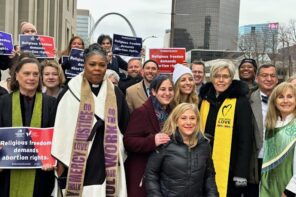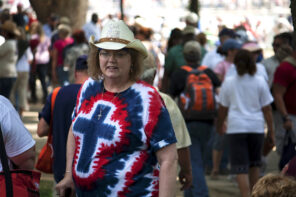Loyal readers know that I indulge in hyperbole less often than George W. Bush reads a book, but I have to say that if the data from Robert Putnam and David Campbell pans out, it has the potential to be the biggest long-term political story of the next twenty years:
American Grace: How Religion Divides and Unites Us reports on Putnam and Campbell’s Faith Matters national survey of 3,000 Americans. Among the conclusions is this one: “The association between religion and politics (and especially religion’s intolerance of homosexuality) was the single strongest factor in this portentous shift.”
That shift is the decline in participation by all Americans, but particularly young adults, in churches. In 1990 only 7 percent of Americans indicated “none” as religious affiliation. By 2008 that number had grown to 17 percent. But among young adults, in their twenties, the percent of “nones” is reaching nearly 30%. The new “nones” are heavily concentrated among those who have come of age since 1990.
Why is this so ground-shaking? Because religiously unaffiliated voters, along with seculars, atheists and members of “small” religious sects, are some of the Democratic party’s strongest supporters. Meanwhile, the churches they’re leaving are some of the Republicans’ core groups. That, along with growth in Hispanic immigration, could spell a whole heap of demographic trouble for the GOP in the next couple of decades.
Below the fold comes the analysis.
Some of this is due to non-political social changes, certainly. Geographical mobility, rising incomes and education, and lack of family religious affiliation have all been correlated to decreases in religious participation.
But Putnam and Campbell argue that along with those changes, a large segment of the population has been driven away from Christianity by its identification with conservative politics. In a nutshell, “church-going progressives and secular conservatives” walked away from the church. The issues surrounding social acceptance of the queer community stand out in particular:
According to Putnam’s research, the percentage of twentysomethings who said homosexual relations were “always” or “almost always” wrong plummeted from about 75 percent in 1990 to 40 percent in 2008.
That’ll do it.
Now, before we go any farther, we should note some things. First off, the increase in religiously unaffiliated young people is not a guarantee of long-term disaffiliation, let alone a rise in atheism. The “nones” don’t have a problem with religion in general, and they often hold fairly traditional religious views. But they’re sick of their religion and the messages they get from it, even as they hold on to their beliefs. As Putnam points out in a BBC interview, that combination leaves room for young people to be brought back into church:
I’d be shocked if over the next 30-40 years there was long-term secular trend in the US as there has been in Europe. It always could happen but there is no evidence that it is happening at all….I think American religious life will renew itself. It will no doubt change; it always does. Historically, religion was a very positive progressive force in America. None of the major social movements in America lack a very positive religious motivation. The Civil Rights movement was at its core a very religious movement. In Europe people are accustomed to seeing the political dimensions of religion as being conservative, and that’s been true in America over the last 20-30 years, but that’s not been true in America historically….Progressives at their peril ignore the power of religious rhetoric and religious organization and religious motivation for making social change.
Nor does disaffiliation mean, as is sometimes argued, that conservative Christians are winning the hearts and souls of the church over more-liberal, “less faithful” rivals. As has often been pointed out, the Catholic church is among the hardest hit by this trend, and conservative evangelicals are simply behind the curve a bit, leaving “thinly veiled entertainment ministries” such as Joel Osteen’s to capitalize. As RD’s Sarah Posner demonstrates, the entertainers can still pack a might political wallop, but they remain a relatively small slice of the American Christian flora and fauna.
Last but not least, this is no cause for Democratic triumphalism either. “Nones” go blue at significantly lower rates than “seculars” or “atheist/agnostics”, and some recent polls may indicate that they’re souring on Dems. Could be they think the Democrats have gone too far to the left, but it’s perhaps even more likely that they think the party under Obama hasn’t delivered on its progressive promises. Either way, one or two election cycles is not enough to firmly establish a pattern.
I suspect that what it’s going to come down to is whether or not Democrats can sell young “nones” on the idea that they have more than just being gay-friendly in common. Given where young people in general have been heading, the indications are pretty good, as long as Dems deliver on some of those promises.
Which means that, just as Putnam says, “Progressives at their peril ignore the power of religious rhetoric and religious organization and religious motivation for making social change.” Of course, that in turn might mean that they wind up alienating an entire generation of strongly secular voters leery of the intermixing of religion and politics. But as previously discussed, I don’t go in much for hyperbole.




